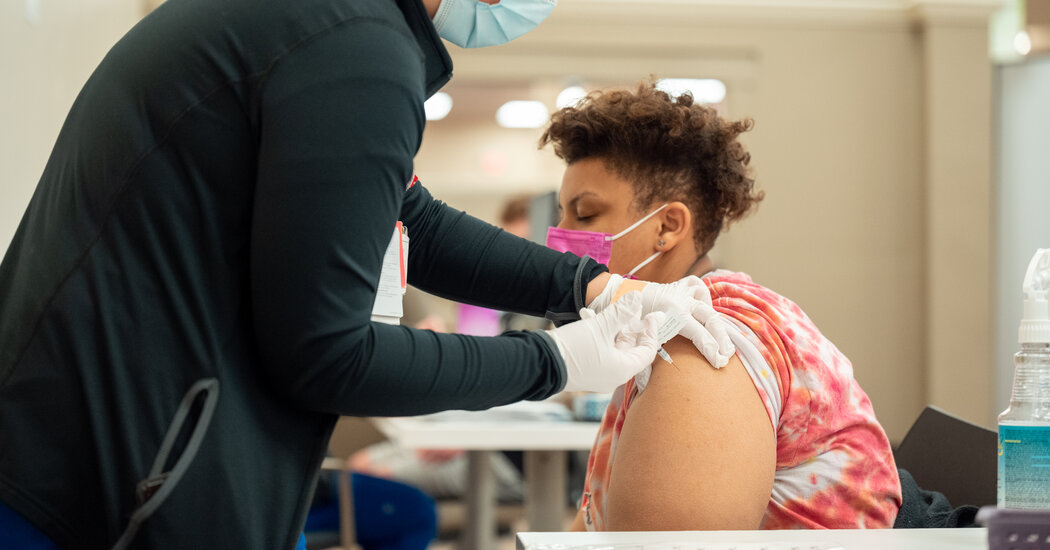Covid-19 Vaccines Temporarily Affected Periods, Study Shows

Nearly half of the participants of a recent study who were menstruating regularly at the time of the survey reported heavier bleeding during their periods after receiving the Covid-19 vaccine. Others who did not typically menstruate — including transgender men, people on long-acting contraceptives, and post-menopausal women — also experienced unusual bleeding.
The new study — the largest to date — expands on research that has highlighted the temporary effects of Covid-19 vaccines on menstrual cycles, but until now focused primarily on cisgender women who menstruate.
Although the vaccines have largely prevented deaths and severe disease with few reported side effects, many medical experts initially brushed aside concerns when women and gender-diverse people started reporting erratic menstrual cycles after receiving the shots.
To get a better sense of these post-vaccination experiences, researchers at the University of Illinois at Urbana-Champaign and Washington University School of Medicine in St. Louis distributed an online survey in April 2021 to thousands of people across the globe. After three months, the researchers collected and analyzed more than 39,000 responses from individuals between the ages of 18 and 80 about their menstrual cycles. All the survey respondents had been fully vaccinated — with the Pfizer-BioNTech, Moderna, Johnson & Johnson vaccines or another that had been approved outside the United States. And to the best of their knowledge, the participants had not contracted Covid-19 before getting vaccinated.
The research, published Friday in the journal Science Advances, shows that 42 percent of people with regular menstrual cycles experienced heavier bleeding after vaccination, while 44 percent reported no change and 14 percent reported lighter periods. Additionally, 39 percent of respondents on gender-affirming hormone treatments, 71 percent of people on long-acting contraceptives and 66 percent of postmenopausal women experienced breakthrough bleeding after one or both of their shots.
“I think it’s important that people know this can happen, so they’re not scared, they’re not shocked and they’re not caught without supplies,” said Katharine Lee, a biological anthropologist at the Washington University School of Medicine in St. Louis, and the study’s first author.
Dr. Lee cautioned, however, that the study did not compare the results with a control group of people who did not get vaccinated. And it is possible that people who observed changes in their cycles after vaccination may have been more likely to participate in the survey. Still, the findings line up with smaller studies that have reported menstrual changes after vaccination with more robust controls.
Importantly, the new study also found that some demographics may be more likely to experience menstrual changes, and the study may help them be better prepared, Dr. Lee said. A heavier menstrual flow was more likely for those who were older, for instance. Survey respondents who used hormonal contraception, had been pregnant in the past or had been diagnosed with a reproductive condition like endometriosis, fibroids or polycystic ovarian syndrome were also more likely to have heavier bleeding during their periods. People who identified as Hispanic or Latino tended to report heavier bleeding too. And people who experienced other side effects of the vaccines, like a fever or fatigue, also had a higher chance of experiencing erratic periods.
Postmenopausal women who were slightly younger, around an average age of 60, were more likely to experience breakthrough bleeding after the vaccine than those who were older. But the type of vaccine postmenopausal women received, whether they had other side effects like a fever or whether they had a past pregnancy did not seem to have an effect on their bleeding.
Why do these changes occur?
Some level of variation in menstruation — the number of days you bleed, the heaviness of your flow and your cycle length — is normal.
“Our menstrual cycles are not perfect clocks,” said Dr. Alison Edelman, a professor of obstetrics and gynecology at Oregon Health & Science University who has also studied the impact of Covid-19 vaccines on menstruation.
Hormones secreted by the hypothalamus, the pituitary gland and the ovaries regulate the monthly cycle, and they can be affected by both internal and external factors. Stress and illness, weight loss or weight gain, calorie restriction and intense exercise can all change typical patterns of menstruation.
The endometrium, which lines the uterus and is shed during menstruation, has also been linked to the immune system. Because of the role it plays in the remodeling of uterine tissue and offering protection against pathogens, it is possible that when vaccines activate the immune system, which is what they should be doing, they also somehow trigger downstream effects in the endometrium, causing a disturbance in your menstrual cycle, Dr. Edelman said. And some individuals may be more sensitive to immune or hormone changes in their body.
In her research, Dr. Edelman found that some women’s periods came a day or two later than usual after they got vaccinated against coronavirus. But the changes were temporary — menstruation tended to return to normal after one or two cycles.
What to do if you notice menstrual irregularities after the Covid vaccine
If you experience any new or unusual patterns of bleeding, take note of it. The menstrual cycle can be thought of as another vital sign, just like your body temperature or blood pressure, that provides clues about your health, said Dr. Jennifer Kawwass, a reproductive endocrinologist at Emory University, who was not involved in the study.
“A significant change in menstrual cycle interval or bleeding profile warrants further investigation to be sure there is not an underlying endocrinologic, hematologic or anatomic cause,” Dr. Kawwass said. Breakthrough bleeding in people who no longer normally menstruate, for example, may also be a warning sign of cervical, ovarian, uterine or vaginal cancer.
That being said, subtle variation in your menstrual cycle, if you have regular periods, should not be a cause for concern and does not require that you change anything you would normally do, Dr. Kawwass said.
Clinical trials and other studies have already established that the Covid-19 vaccines are safe and effective and are unlikely to impact fertility in the long term.
Should you get vaccinated at a certain time in your cycle?
Experts agree that the chaos Covid-19 can cause throughout your body, including potential lingering effects, is far worse than any side effects caused by vaccination against the disease.
People who have previously gotten a fever after a shot may plan their next dose on a day when they will not have to go in to work, Dr. Edelman said. But you should not let temporary menstrual changes prevent you from getting fully vaccinated or boosted. Since cases are on the rise again, delaying vaccination for two weeks or longer may significantly increase your risk of getting Covid-19, she said.
Still, it’s important to track your body’s response to vaccination, and public health officials should acknowledge concerns about menstrual cycle variations in addition to warning people of the risk of getting Covid-19, said Keisha Ray, a bioethics expert at McGovern Medical School at UTHealth Houston.
The increased transparency around menstrual changes or other side effects of vaccination could also have another benefit: reducing people’s vaccine hesitancy.
“We’re trying to be truthful. We’re trying to validate people’s lived experiences,” said Dr. Lee. In turn, she hopes that the new research will help improve conversations around people’s health and lead to more inclusive clinical trials in the future.


